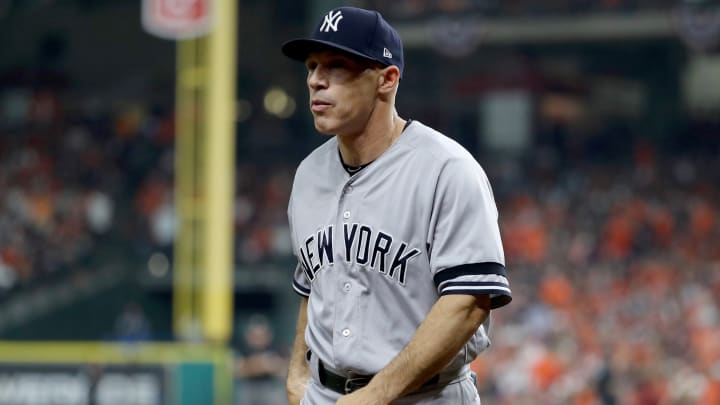The Yankees Make a Cold, Calculating Decision by Refusing to Retain Joe Girardi

In major-league history only 27 skippers have career records of 190 or more games above .500. Just four of them managed in 2017. And on Thursday the Yankees decided not to retain their member of that club, parting ways with manager Joe Girardi after 10 seasons of .562 ball and a surprising 91–71 season that left New York one win from the World Series. Never on Girardi’s watch did the team finish worse than 84–78, and they made the postseason more often than they missed it.
While a manager’s record largely reflects not his abilities as a strategist or motivator or teacher (which are his most consequential traits) but the talent assembled on the roster (over which, excluding allocation of playing time, he has little control), it’s still hard to see much that the courtly Girardi did to merit the ending of his tenure. He joins Red Sox manager John Farrell and Nationals manager Dusty Baker as skippers who made the postseason in 2017 but won't return in 2018.
He gracefully transitioned the Yankees from their bloated-veteran-mess years to today’s youth movement. In 2014, the team’s average age was 31.4, and Derek Jeter, Ichiro Suzuki and Mark Teixeira held starting jobs; in 2017, it was 27.9, and five of its six best players by wins above replacement were age 27 or younger. He stuck with Aaron Judge and Aaron Hicks despite the struggles both had in 2016, and in 2017 they combined for 12 WAR. Although teams can tune out long-tenured coaches, Girardi had survived long enough in his role that by 2017 he was ministering to an almost entirely new group of Yankees.
Yankees Part Ways With Joe Girardi As Manager After 10 Years
Sometimes managers whiff on bullpen management, but not Girardi. Over the ten seasons he was in charge, from 2008 to 2017, Yankee relievers ranked first in win probability added (WPA) and clutch performance, per Fangraphs. That said, in 2017, the Yankees’ pen finished middle-of-the-pack in WPA and a distant last in clutch. (A great deal of the blame here lies with Tyler Clippard, whom the Yankees ditched in July. Although it’s not all Clippard’s fault that the team also finished nine wins short of its Pythagorean win expectation, with an 18–26 record in one-run games.)
And he capably handled the unrelenting scrutiny that comes with managing in New York. While each year the crosstown Mets found new ways to self-immolate, Girardi passed his decade-long tenure without major humiliation. He tamped down brewing controversies before they turned toxic, and he stuck up in the press for his players. Even the 2016 euthanizing of Alex Rodriguez occurred relatively smoothly; Girardi, who always had a special place in his heart for the little-loved star, wept after Rodriguez’s last game.
Indeed, off the field Girardi showed more vulnerability than most managers, including recently in his press conference after winning Game 4 of the Division Series against Cleveland earlier this month. He had been asked what it had been like to go from down 2–0 in the series to tying it at two. He mentioned how hard the Game 2 loss had been. “And it’s difficult because I care so much. And it’s not just—it’s not caring about myself. It’s caring about everyone else that is involved and that is wrapped up in Yankee baseball. You know, whether it's the fans, the front office, the owner, the players, the trainers, the support staff, the coaches. I really care.” He was crying when he said all of this.
It’s hard to know whether his remarks that night were a plea to save his job or simply an expression of regret, before what could have been the final home game of his tenure, that all of his caring had gotten him nowhere with Yankee brass. Even Thursday, in announcing his departure, Girardi noted that he was doing so “with a heavy heart.”
But then, this is not a moment in baseball where caring comes close to being enough. Front offices are looking for managers who will care but also execute their data-underpinned marching orders at every juncture. Undoubtedly every general manager watches the World Series with jealousy, given the apparent pliability of A.J. Hinch and Dave Roberts.
Girardi was no Luddite, but with a promising future arriving ahead of schedule, he was keener on autonomy than the Yankees would have liked. And so the manager with the 910–710 career record in New York heads home, and the talent-flush ballclub begins casting about for someone new.
